Environmental groups and northern Indigenous communities are applauding a move by the International Maritime Organization (IMO) to work towards banning the use of the highly polluting heavy fuel oil from Arctic shipping and are calling on member states to adopt and implement the ban by 2021.
Members states of the UN specialized agency agreed to plans to develop a ban on heavy fuel oil (HFO), also known as bunker oil, from Arctic shipping, along with an assessment of the impacts of such a ban, during the IMO’s Marine Environment Protection Committee (MEPC72) meeting, which concluded Friday in London.
The global maritime regulator also agreed to climate targets for the sector, as part of its first comprehensive greenhouse gas emissions (GHG) reduction strategy and to tackle the growing problem of plastics in the ocean.
The meeting directed the sub-committee on Pollution Prevention and Response (PPR) to develop a ban on heavy fuel oil use and carriage for use by ships in the Arctic, “on the basis of an assessment of the impacts” and “on an appropriate timescale.”
Already banned in the Antarctic
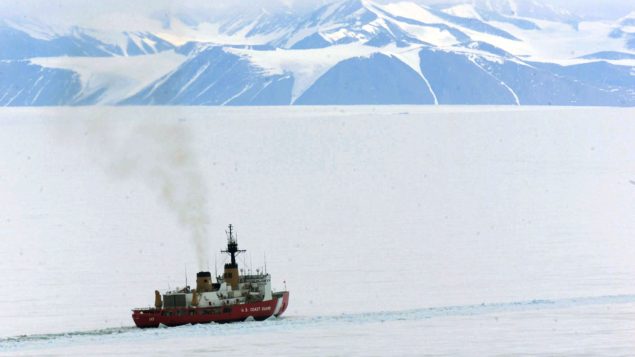
A United States Coast Guard icebreaker works in McMurdo Sound keeping a channel free for supply ships reaching the Antarctica’s McMurdo Station and Scott Base. Picture taken January 1 2000. (via REUTERS)
The use of HFOs is already banned in the Antarctic. Several environmental and Indigenous groups have been campaigning for a similar ban in the Arctic.
“Thanks to inspired and motivated action taken by a number of IMO member states to move towards a ban on heavy fuel oil, Arctic communities and ecosystems will be protected from the threat of oil spills, and the impact of black carbon emissions,” said Sian Prior, lead advisor to the Clean Arctic Alliance, a coalition of 18 non-governmental organisations working to end HFO use as marine fuel in Arctic waters.
“A ban is the simplest and most effective way to mitigate the risks of HFO – and now we’re calling on the IMO to ensure that this ban will be in place by 2021.”
Protecting way of life

IMO Secretary General Kitack Lim receives several Arctic Indigenous Leaders from the United States of America, Canada and the Russian Federation at IMO Headquarters, London on 9 April 2018. (IMO)
Alaskan Verner Wilson, senior oceans campaigner for Friends of the Earth U.S., said the ban would help protect Arctic communities and their traditional way of life.
“For thousands of years we have relied on our pristine waters and wildlife – and now the IMO has taken this important step to help protect our people and environment,” said Verner, a member of Curyung Tribal Council, with Yupik family roots in the Bering Strait region between Russia and the U.S.
Andrew Dumbrille, a World Wildlife Fund Canada specialist in sustainable shipping, said it is now not a question of ‘if’ but rather ‘when’ a ban on HFO should be put in place.
“With the Arctic facing growing risks from oil spills and black carbon emissions from ships, the marine sector needs to quickly transition away from polluting fuels like HFO,” Dumbrille said.
“WWF calls on member states to make every effort to adopt and rapidly implement a ban by 2021, without burdening communities with the costs.”
Compromise between Finnish and Canadian proposals
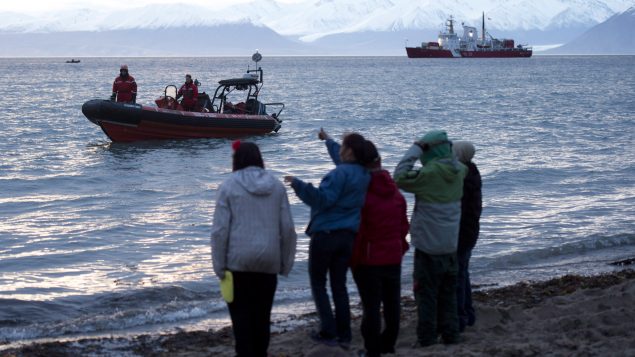
Children from the town of Pond Inlet watch a boat shuttle people and cargo to the CGS Des Groseilliers Saturday August 23, 2014 in Pond Inlet, Nunavut. (Adrian Wyld/THE CANADIAN PRESS)
The proposal to ban HFO as shipping fuel from Arctic waters — which would be mandatory for all ships operating under the International Convention for Prevention of Pollution from Ships (MARPOL) — was co-sponsored by Finland, Germany, Iceland, Netherlands, New Zealand, Norway, Sweden and United States.
While agreeing that “the threat of an accidental oil spill in Arctic waters remains the most significant threat from ships to the Arctic marine environment,” Canada, on the other hand, had urged the IMO to consider “economic and other impacts to Arctic communities associated with the restriction or phase-out of heavy fuel in Arctic waters.”
- Inuit activist blasts Canada’s foot-dragging on dirty fuels ban in the Arctic
- International maritime body adopts Canadian proposal on heavy fuel oil in Arctic waters
It appears the IMO plan is a compromise between the Finnish and Canadian proposals, Dumbrille said.
The combined Finish-Canadian proposal was supported by Australia, Belgium, Czech Republic, Denmark, Estonia, France, Ireland, Japan, the League of Arab States, Poland, Portugal, Spain, Switzerland, and the U.K.
“What everybody wants is a ban that doesn’t pass on the costs to Arctic communities,” Dumbrille said in a phone interview from London.
Support from Denmark is particularly notable as it is the sixth Arctic nation to support the ban, said Dumbrille.
Kåre Press-Kristensen, senior advisor in the Danish Ecological Council, the next step will be to engage Greenland further in planning and preparing for the ban.
Russia is not completely on board
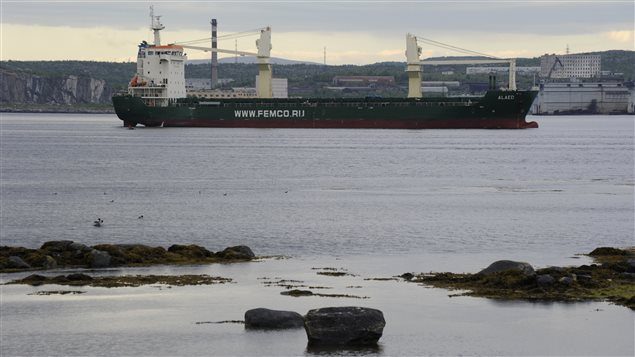
The Russian-operated ship Alaed is moored outside the northern port of Murmansk June 23, 2012. (Stringer/Reuters)
However, Russia, the largest Arctic power, is yet agree to the ban.
“Russia has basically said the ban is a measure of last resort,” Dumbrille said. “They’ve put forward a number of other potential mitigation measures like routing around sensitive areas, but still using and carrying HFO.”
The MEPC will meet again in October to further discuss the ban and the impact assessment reports, Dumbrille said.
Following that, the PPR sub-committee will meet in February 2019 to develop a definition of HFO and prepare a set of guidelines on mitigation measures to reduce risks of use and carriage of HFO as fuel by ships in Arctic waters.
Dirty and cheap
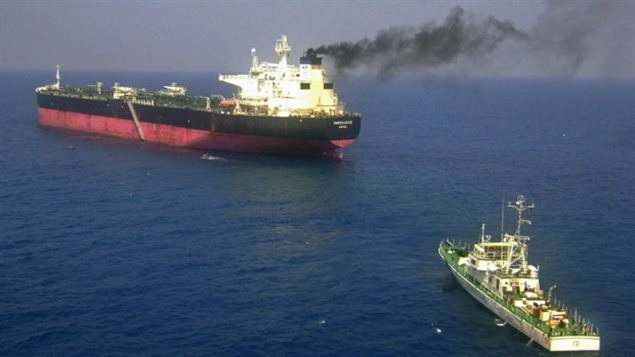
An example of a cargo ship emitting black, sulphur dioxide and soot-laden smoke from burning HFO (bunker fuel). Finland is proposing a mandatory ban on use and carriage of HFO by ships operating in the Arctic. (Indian Navy/Associated Press)
Heavy fuel oil is the cheapest and the dirtiest marine fuel, accounting for 80 per cent of all fuels used in maritime shipping, according to a report by the International Council on Clean Transportation (ICCT).
Heavy fuel oil – a thick viscous residual fuel that produces high amounts of soot, particulate matter and black carbon – was also the most consumed marine fuel in the Arctic in 2015, the report said.
Although only 42 per cent of ships in the Arctic waters covered by the IMO’s Polar Code operated on HFO in 2015, these ships accounted for 76 per cent of fuel carried and 56 per cent of fuel transported in this region, the ICCT report said.
In addition to its toxicity, HFO is extremely viscous and breaks down more slowly in the marine environment than other fuels, particularly in colder regions like the Arctic, according to IMO documents.
“Studies show that while 90 per cent of HFO remains after 20 days in the ocean, marine diesel can take as few as three days to break down,” the documents said.
HFO’s persistence makes it more likely that any spill will eventually reach and pollute the shoreline, the report said.
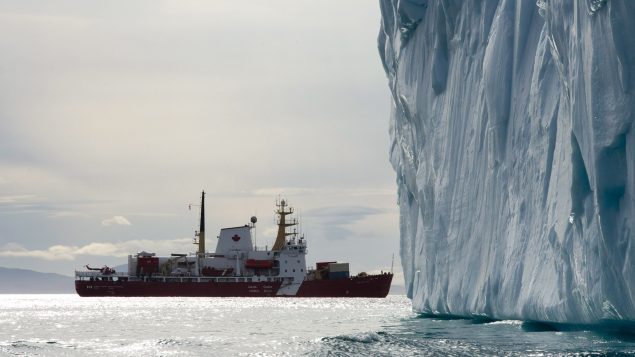






For reasons beyond our control, and for an undetermined period of time, our comment section is now closed. However, our social networks remain open to your contributions.